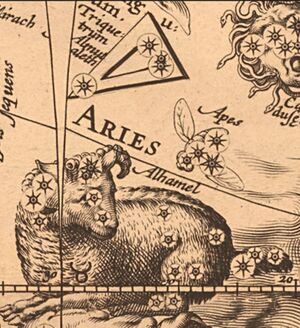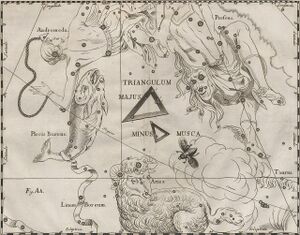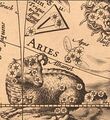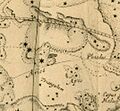Musca Borealis
Apes or Musca Borealis is an obsolete constellation in Aries that was used in Early Modern Europe. Itwas created by Plancius (1612) and reused by other authors with all sorts of name variants.
Etymology and History
Name Variants
- Apes (Latin: The Bee)
- Vespa (Latin: The Wasp)
- Musca (Latin: The Fly) - not be confused with the (modern) constellation Musca next the Southern Cross (Crux)
- Musca Borealis (Latin. The Northern Fly)
- ... and all these names in European languages (French: Le Mouche, English: The Fly, German: Fliege).
Origin of Constellation
Ian Ridpath writes:[1]
This abandoned constellation, which lay in the northern part of present-day Aries, has a confusing history. It was introduced on a globe of 1612 by the Dutchman Petrus Plancius under the name Apes, the Bee. He created it from four of Ptolemy’s unformed stars of 4th and 5th magnitude which were described in the Almagest as lying ‘over the rump’ of Aries. The German astronomer Jacob Bartsch altered its name to Vespa, the Wasp, on his map of 1624, but retained the name Apes in his accompanying text.
Johannes Hevelius changed the type of insect altogether when he renamed it Musca, the fly, on his Firmamentum Sobiescianum atlas of 1687. This was confusing, since there already was a Musca in the southern hemisphere, created almost a century earlier from the observations of Keyser and de Houtman. Hevelius did not list his northern Musca as a separate constellation in his accompanying catalogue, but retained its four stars under his entry for Aries. We now know them as 33, 35, 39, and 41 Arietis. Johann Bode showed Musca on his Uranographia atlas of 1801, but within the borders of Aries (below).
The constellation later became known as Musca Borealis, the northern fly, to distinguish it from its southern namesake. This longer name seems to have first appeared on Alexander Jamieson’s Celestial Atlas of 1822 (Plate 13). Eventually, the northern fly was swatted by astronomers, although the southern Musca remains.
Transfer and Transformation of the Constellation
Mythology
There is no mythology
Weblinks
References
- ↑ Ian Ridpath, Star Tales (online edition): Musca Borealis.











